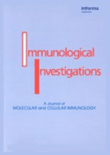
IMMUNOLOGICAL INVESTIGATIONS
Scope & Guideline
Elevating Immunological Knowledge for Professionals and Scholars
Introduction
Aims and Scopes
- Immunological Mechanisms in Disease:
The journal explores the role of immune responses in various diseases, including autoimmune disorders, cancers, and infectious diseases, providing insights into pathogenesis and potential therapeutic targets. - Cytokine Profiles and Immune Regulation:
A significant focus is placed on the analysis of cytokine levels and their regulatory roles in immune responses, highlighting their implications in disease severity and treatment outcomes. - Extracellular Vesicles and Immune Modulation:
Research on extracellular vesicles as mediators of intercellular communication and their roles in modulating immune responses is a key area, emphasizing their potential as biomarkers and therapeutic agents. - Genetic and Epigenetic Influences on Immunity:
The journal investigates the genetic polymorphisms and epigenetic modifications that affect immune responses, contributing to our understanding of disease susceptibility and progression. - Therapeutic Approaches and Immunotherapy:
A core aim is to evaluate and discuss various immunotherapeutic strategies, including CAR-T cell therapies, dendritic cell vaccines, and other innovative treatments targeting immune pathways.
Trending and Emerging
- Neuroimmunology:
An increasing number of studies are exploring the interactions between the nervous system and immune responses, particularly in the context of neurodegenerative diseases and neuroinflammation. - Microbiome-Immune Interactions:
Research on the gut microbiome's influence on immune responses is gaining traction, highlighting its role in modulating inflammation and disease outcomes. - Extracellular Vesicles in Disease Modulation:
The role of extracellular vesicles in immune regulation and their potential as biomarkers or therapeutic vehicles is a rapidly growing area of interest. - Personalized Immunotherapy:
There is a notable increase in research focused on personalized approaches to immunotherapy, tailoring treatments based on individual genetic and immunological profiles. - Integrative Omics Approaches:
The application of multi-omics strategies, including genomics, proteomics, and transcriptomics, is emerging as a vital tool for understanding complex immune responses in various diseases.
Declining or Waning
- Classic Autoimmunity Studies:
There has been a noticeable decrease in studies focusing exclusively on traditional autoimmune disease mechanisms, as newer approaches and technologies are being prioritized. - Single-Pathway Investigations:
The trend towards studying single pathways or mechanisms in isolation is declining, with a shift towards more integrative and systems biology approaches that consider multiple interacting pathways. - In-Vitro Studies:
The prevalence of in-vitro studies is waning as there is a growing emphasis on in-vivo models and clinical studies that provide a more comprehensive understanding of immune responses in real biological contexts. - Inflammation without Contextual Disease Models:
Research focused solely on inflammation without linking it to specific disease contexts is less frequent, as the journal pivots to studies that connect inflammation with broader disease mechanisms and therapeutic implications.
Similar Journals

Journal of Immunotoxicology
Elevating Research in Immunotoxicology GloballyJournal of Immunotoxicology, published by Taylor & Francis Ltd, is at the forefront of research in the intersecting fields of immunology and toxicology. With an annual impact factor that reflects its growing influence, this Open Access journal has been essential for disseminating valuable knowledge since its inception in 2004. The journal welcomes novel research articles, reviews, and commentary that explore the effects of xenobiotics on the immune system, contributing to a deeper understanding of immunotoxicological mechanisms and implications for human health. As a recognized platform, it has achieved commendable rankings in Scopus, positioning it within Q3 in Immunology and Q2 in Toxicology categories as of 2023. This ensures that the journal remains a critical resource for researchers, professionals, and students seeking to advance their knowledge and contribute to the evolving landscape of immunotoxicology. With an Open Access model since 2017, it maximizes accessibility and reaches a global audience, supporting the collaborative efforts needed to address contemporary challenges in health and safety.
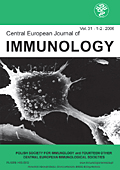
Central European Journal of Immunology
Exploring New Horizons in Immune ResearchCentral European Journal of Immunology is a premier publication dedicated to advancing the field of immunology and allergy research. Established in 1996 and published by TERMEDIA PUBLISHING HOUSE LTD, this open access journal has consistently provided a platform for innovative research and comprehensive reviews since its transition to open access in 2002. With an ISSN of 1426-3912 and E-ISSN of 1644-4124, it embraces a global readership while being rooted in Poland. The journal, with a notable Q3 ranking in both the categories of immunology and allergy in 2023, positions itself within the competitive landscape of scientific discourse, as reflected in its Scopus rankings. Designed for researchers, professionals, and students, the Central European Journal of Immunology not only disseminates significant findings but also fosters collaboration and innovation in the immunological sciences, making it a vital resource for those seeking to stay current in this rapidly evolving field.

JOURNAL OF IMMUNOLOGY
Driving Discoveries in Immune HealthWelcome to the JOURNAL OF IMMUNOLOGY, a prestigious publication associated with the American Association of Immunologists and dedicated to advancing the field of immunology. With a rich history dating back to 1945, this journal is renowned for its high-impact research, evident in its notable 2023 Q1 rankings in both Immunology and Allergy, as well as its strong positions in Scopus rankings—Rank #68 in Immunology and Allergy and Rank #79 in Immunology and Microbiology. Although it operates on a subscription basis, its commitment to publishing cutting-edge studies ensures that it remains a vital resource for scientists, healthcare professionals, and students alike. As the journal continues to pave the way for innovative research and breakthroughs in immunological science, it facilitates a platform for dialogue and discovery among researchers and practitioners across the globe.

Immunity Inflammation and Disease
Elevating the discourse on therapeutic strategies for inflammatory diseases.Immunity, Inflammation and Disease is a premier open-access journal published by WILEY, dedicated to advancing the field of immunology and allergy. Launched in 2013, this journal has established itself as a significant platform for researchers and professionals to disseminate high-quality research findings and innovative insights that address critical issues in immune responses and inflammatory diseases. With an impact factor that reflects its growing influence and a current ranking in Q3 for Immunology and Q2 for Immunology and Allergy, this journal serves a diverse audience keen on exploring cutting-edge developments. Researchers are encouraged to submit their work to share their findings with a global reach, foster collaboration, and enhance the understanding of immune mechanisms and therapeutic strategies. Accessible since its inception, Immunity, Inflammation and Disease is committed to open science, ensuring that vital research is freely available for the advancement of knowledge within the academic community and beyond.

Genes & Diseases
Unlocking the secrets of genes to combat diseases.Genes & Diseases, published by KEAI PUBLISHING LTD, is a premier open-access journal dedicated to advancing the fields of genetics, biochemistry, and molecular biology. Established in 2014 and headquartered in Beijing, China, this journal has quickly risen to prominence, securing a place in the prestigious Q1 quartile in Biochemistry and Genetics (clinical), as well as Q2 in Cell Biology and Q1 in Molecular Biology as of 2023. With a commitment to disseminating cutting-edge research, Genes & Diseases serves as a critical platform for researchers, professionals, and students alike, ensuring that high-quality scientific work is openly accessible to the global community. The journal's exceptional impact is underscored by its selective Scopus rankings, which reflect its influence and relevance in key scientific domains, making it an essential resource for those exploring the intersections of genetics and disease pathology.

BMC Immunology is a prominent open-access journal published by BMC that has been at the forefront of immunological research since its inception in 2000. Based in the United Kingdom, this journal aims to advance the understanding of immune system functions and disorders through high-quality, peer-reviewed articles. With an impressive scope encompassing various facets of immunology, BMC Immunology has earned a Q3 ranking in the Immunology category according to the 2023 category quartiles, demonstrating its growing impact and relevance in the scientific community. Researchers and professionals will find valuable insights in its array of published works, spanning both foundational studies and innovative applications. The journal's commitment to open access ensures that cutting-edge research is freely available, fostering collaboration and advancement in the field. For those looking to stay updated on the latest developments in immunology, BMC Immunology stands as an essential resource for researchers, professionals, and students alike.
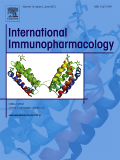
International Immunopharmacology
Pioneering Insights in Immunopharmacological ResearchInternational Immunopharmacology, published by Elsevier, stands as a prominent journal within the disciplines of immunology and pharmacology. With an ISSN of 1567-5769 and an E-ISSN of 1878-1705, this esteemed journal is based in the Netherlands and features a robust commitment to disseminating high-quality research from its inception in 2001 through 2024. The journal has achieved impressive rankings, securing a Q1 category in Pharmacology and Q2 in both Immunology and Immunology and Allergy as of 2023. With its strategic focus on bridging the gap between immunology and pharmacological applications, International Immunopharmacology attracts a diverse readership, including researchers, healthcare professionals, and students interested in the latest advancements in therapeutic agents and immune system modulation. Furthermore, it offers an open access option, enhancing the accessibility and reach of its invaluable content. As a pivotal resource in the field, this journal not only facilitates the exchange of innovative ideas but also fosters a deeper understanding of the complexities of immunopharmacology in today’s research landscape.
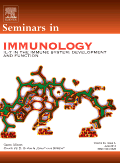
SEMINARS IN IMMUNOLOGY
Elevating Discourse in Allergy and ImmunologySEMINARS IN IMMUNOLOGY, published by Academic Press Ltd - Elsevier Science Ltd, stands as a leading journal in the field of immunology and allergy, with an impressive impact factor that reflects its significant contribution to advancing research and discourse within these vital areas of medical science. Established in 1989, this esteemed journal has garnered a reputation for disseminating high-quality, peer-reviewed articles that span a broad spectrum of immunological topics, making it an essential resource for researchers, healthcare professionals, and students alike. Currently ranked Q1 in both Immunology and Allergy categories, SEMINARS IN IMMUNOLOGY ranks 39th among 233 journals in Immunology and Allergy and 43rd among 236 in Immunology and Microbiology according to Scopus, placing it in the 83rd and 81st percentiles respectively. This underscores its pivotal role in shaping the future of immunological research and clinical practices. While the journal operates under a subscription model with no open access option, it remains committed to providing comprehensive insights and fostering scholarly collaboration within the global immunology community.
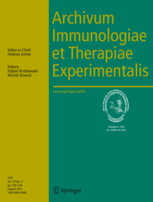
ARCHIVUM IMMUNOLOGIAE ET THERAPIAE EXPERIMENTALIS
Elevating the Standards of Immunological ScholarshipARCHIVUM IMMUNOLOGIAE ET THERAPIAE EXPERIMENTALIS, published by DE GRUYTER POLAND SP Z O O, stands as a pivotal journal in the field of immunology, contributing significantly to the advancement of knowledge and therapy in this crucial area of medicine since its inception in 1954. With an ISSN of 0004-069X and an E-ISSN of 1661-4917, the journal operates out of Switzerland, catering to an international audience of researchers, practitioners, and students. As reflected in its Scopus rankings, the journal is positioned within the third quartile in both Immunology and Allergy (Q3) and holds a commendable second quartile in Medicine (miscellaneous) (Q2), indicating its respectable influence within the academic community. The journal publishes original research, reviews, and clinical studies, offering a platform for exploring cutting-edge developments in immunological therapies and experimental methods. Although not currently an open-access journal, it continues to thrive as a valuable resource, reflecting a commitment to disseminating high-quality research and fostering academic discourse in the field. Researchers and professionals alike will find ARCHIVUM IMMUNOLOGIAE ET THERAPIAE EXPERIMENTALIS an essential reference source for the latest advancements in immunological research and clinical applications.

CANCER IMMUNOLOGY IMMUNOTHERAPY
Leading the Charge in Cancer Immunology InnovationsCancer Immunology Immunotherapy, published by Springer, stands as a premier journal in the fields of cancer research and immunology, holding a prestigious Q1 ranking across multiple categories, including Oncology and Medicine as of 2023. With an ISSN of 0340-7004 and an E-ISSN of 1432-0851, this journal has been a pivotal platform for groundbreaking research since its inception in 1976, continuing to provide insight into the complex interactions between the immune system and cancer. The journal's scope encompasses a wide array of topics, including novel therapeutic strategies, immunological mechanisms, and translational science aimed at advancing treatment outcomes for cancer patients. Renowned for its rigorous peer-review process and high impact factor, it attracts contributions from leading experts and researchers around the globe, positioning itself among the top-tier publications with Scopus rankings that reflect its vital role in advancing the field. Access options are generally subscription-based, ensuring a comprehensive resource for professionals and academics seeking to deepen their understanding and make meaningful contributions to cancer immunotherapy.